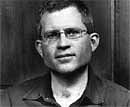
Christian Wiman is an award-winning poet, essayist, critic and the youngest editor of Poetry, America’s oldest literary magazine. His first book The Long Home, won the 1998 Nicholas Roerich Prize. Born and raised in Texas, Wiman, 41, suffers from a rare and incurable blood cancer. That affliction led him back to poetry and a “hope toward God.” Wiman’s poetry and criticism appears regularly in The New Yorker, The Atlantic Monthly andThe New York Times Book Review among other publications. He lives in Chicago, where he has edited Poetry magazine since 2003. His new book of poems, Every Riven Thing, is forthcoming in 2011.
Excerpts from an interview:
You’ve written fiction, poetry, travelogues, essays. Is the transition from one genre to another easy?
I don’t really think of it as a transition. There is the fury and release of poetry, and then there’s prose. That line is very sharply drawn for me, though sometimes material from one genre makes its way into another. As for varieties of prose, I’ve sometimes had a hard time keeping one thing from becoming another: a piece of criticism lapses into a travel narrative, a critical essay includes some anecdote from my own life, etc. I hope this is a strength, but it’s certainly not for me to say.
How does the writing process work for you today?
I used to keep a banker’s hours. I’d work eight hours a day pretty much every day (work included reading). At some point that kind of doggedness actually became counter-productive to me. Now I tend to either be writing or not. That is, either I’m consumed with something and spending every free moment on it, or I’m reading, watching the telly, playing with the dogs ‘gestating’, let’s call it.
What are you working on at present?
I just finished a new book of poems, which will be published in this country next fall. I’m also working on a book of prose that is about, I guess, faith, in various forms. It’s called My Bright Abyss: Meditations of a Modern Believer.
Do you remember how you felt the first time you got published?
Embarrassed, actually. As is often the case with poetry, there was a significant lag between acceptance and publication, plenty of time for me to realize that what I’d written was lousy. I wish I could say that this never happens anymore.
When did you realise you wanted to be a poet?
I didn’t even know that being a poet was a possibility until I went off to college, though I wrote poems or little rhyming songs when I was very young. I was imitating the hymns I heard at church, I imagine, or perhaps, less poetically, the jingles I heard on television.
In ‘Ambition and Survival’ you talk about growing up in a deeply Christian ambience.
Did your family encourage poetry and storytelling at home?
My mother is a very vital and charismatic presence. She’s also the religious engine of our family. No doubt I learned a love for story and a sense of the sacred from her. From my father I’ve inherited a taste for silence and absence, which are also essential qualities of art and religion. Today, I don’t believe many of the things my family believes, and in fact, much of the time I’m not even sure that I believe. My religious upbringing was intense but unsophisticated. When I was exposed to modern philosophy and literature, the structure of my faith fell away. There was still a bedrock of belief, but it took years for me to clear away the rubble enough to see it.
Does poetry have a special place? Should it be in the library and classroom or heard in the street or both?
The answer is both. There is great poetry that is quite difficult and benefits from scholarly analysis, and there is great poetry that can be understood by virtually anyone. The trick, as the president of the Poetry Foundation, John Barr, has written, is to enable poems to find their ‘natural’ audiences.
What advice would you give to beginners?
Read deep into your own tradition and memorize poems from all eras. Read literatures other than your own. Read history, philosophy, theology, science. Travel the world, if you can. If you can’t, travel deeply into your own neighborhood, training yourself to see what other people miss. Find some way of supporting yourself that’s apart from your art. Hopefully, this will feed your imagination and bring new material into your work, but at the very least it will create a useful buffer zone between what you do and what you earn. Keep in mind that all this is coming from someone who edits a poetry magazine for a living, doesn’t like to travel and has forgotten three-quarters of what he’s read.